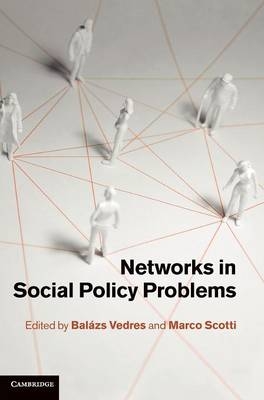
Networks in Social Policy Problems
Cambridge University Press (Verlag)
978-1-107-00983-7 (ISBN)
Network science is the key to managing social communities, designing the structure of efficient organizations and planning for sustainable development. This book applies network science to contemporary social policy problems. In the first part, tools of diffusion and team design are deployed to challenges in adoption of ideas and the management of creativity. Ideas, unlike information, are generated and adopted in networks of personal ties. Chapters in the second part tackle problems of power and malfeasance in political and business organizations, where mechanisms in accessing and controlling informal networks often outweigh formal processes. The third part uses ideas from biology and physics to understand global economic and financial crises, ecological depletion and challenges to energy security. Ideal for researchers and policy makers involved in social network analysis, business strategy and economic policy, it deals with issues ranging from what makes public advisories effective to how networks influence excessive executive compensation.
Balázs Vedres is Associate Professor and Director for the Center for Network Science, Central European University. His research is focused on understanding historical dynamics in network systems. Marco Scotti is Principal Investigator at The Microsoft Research - University of Trento Centre for Computational and Systems Biology (COSBI), where he researches in molecular nutrition, biological networks and stochastic simulations.
1. Introduction M. Scotti and B. Vedres; Part I. Information, Collaboration, Innovation: The Creative Power of Networks: 2. Dissemination of health information within social networks C. Dhanjal, S. Blanchemanche, S. Clemençon, A. Rona-Tas and F. Rossi; 3. Scientific teams and networks change the face of knowledge creation S. Wuchty, J. Spiro, B. F. Jones and B. Uzzi; 4. Structural folds: the innovative potential of overlapping groups B. Vedres and D. Stark; 5. Team formation and performance on nanoHub: a network selection challenge in scientific communities D. Margolin, K. Ognyanova, M. Huang, Y. Huang and N. Contractor; Part II. Influence, Capture, Corruption: Networks Perspectives on Policy Institutions: 6. Modes of coordination of collective action: what actors in policy making? M. Diani; 7. Why skewed distributions of pay for executives is the cause of much grief: puzzles and few answers so far B. Kogut and J.-S. Yang; 8. Networks of institutional capture: a case of business in the State apparatus E. Lazega and L. Mounier; 9. The social and institutional structure of corruption: some typical network configurations of corruption transactions in Hungary Z. Szántó, I. J. Tóth and S. Varga; Part III. Crisis, Extinction, World System Change: Network Dynamics on a Large Scale: 10. How creative elements help the recovery of networks after crisis: lessons from biology A. Mihalik, A. S. Kaposi, I. A. Kovács, T. Nánási, R. Palotai, Á. Rák, M. S. Szalay-Beko and P. Csermely; 11. Networks and globalization policies D. R. White; 12. Network science in ecology: the structure of ecological communities and the biodiversity question A. Bodini, S. Allesina and C. Bondavalli; 13. Supply security in the European natural gas pipeline network M. Scotti and B. Vedres; 14. Conclusions and outlook A.-L. Barabási; Index.
| Erscheint lt. Verlag | 23.8.2012 |
|---|---|
| Zusatzinfo | 50 Line drawings, unspecified |
| Verlagsort | Cambridge |
| Sprache | englisch |
| Maße | 170 x 244 mm |
| Gewicht | 700 g |
| Themenwelt | Naturwissenschaften ► Physik / Astronomie ► Thermodynamik |
| Sozialwissenschaften ► Soziologie ► Allgemeines / Lexika | |
| Sozialwissenschaften ► Soziologie ► Makrosoziologie | |
| ISBN-10 | 1-107-00983-9 / 1107009839 |
| ISBN-13 | 978-1-107-00983-7 / 9781107009837 |
| Zustand | Neuware |
| Haben Sie eine Frage zum Produkt? |
aus dem Bereich


